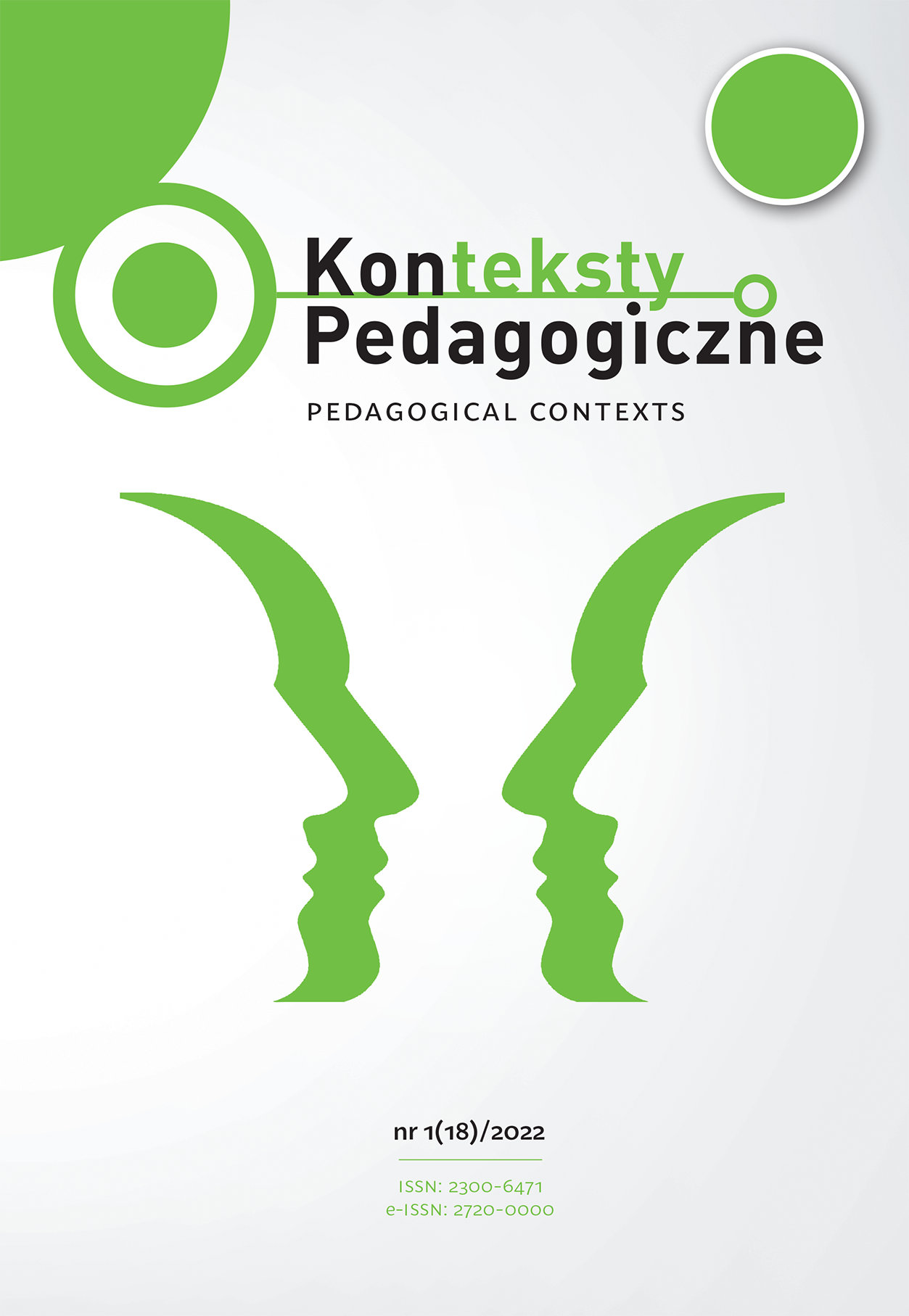Abstrakt
Niepełnosprawność jako zagadnienie teoretyczne stanowi kluczowy składnik programu kształcenia na kierunku pedagogika specjalna. Włączenie do programu tych studiów przedmiotów obejmujących interdyscyplinarną wiedzę na temat niepełnosprawności jest – między innymi – realizacją krytycznych postulatów sformułowanych na gruncie studiów o niepełnosprawności. W artykule zaprezentowane zostały możliwości dydaktyczne i wyzwania związane z realizacją przedmiotu „studia nad niepełnosprawnością” w ramach jednolitych studiów magisterskich na kierunku pedagogika specjalna. Wskazane zostały kluczowe konteksty teoretyczne współczesnej wiedzy o niepełnosprawności, takie jak: nurt eco-ableism, cripowanie edukacji i kultury, nowy materializm, sprawiedliwość dla osób z niepełnosprawnością.
Bibliografia
Barnes, C. i Mercer, G. (2008). Niepełnosprawność, tłum. P. Morawski. Warszawa: Wydawnictwo Sic!.
Brzozowska-Brywczyńska, M. (2013). O performatywności ciał osobliwych. Trzy narracje o niepełnosprawnym ciele, reprezentacji i transgresji. Kultura Współczesna. Teoria, Interpretacje, Praktyka, 3(78), 77–89.
Czerepaniak-Walczak, M. (1999). Kompetencja: słowo kluczowe czy „wytrych” w edukacji? Neodidagmata, XXIV, 53–66.
Dolphijn, R. i van der Tuin, I. (2018). Nowy materializm. Wywiady i kartografie, tłum. zbiorowe. Gdańsk–Poznań–Warszawa: Fundacja Machina Myśli.
Garbat, M. (2017). Społeczny wymiar niepełnosprawności w teorii ekonomii. Studia Oeconomica Posnaniensia, 5(10), 63–84. DOI: 10.18559/SOEP.2017.10.5.
Godlewska-Byliniak, E. i Lipko-Konieczna, J. (red.). (2017). Odzyskiwanie obecności. Niepełnosprawność w teatrze i performansie. Warszawa: Fundacja Teatr 21.
Goodley, D. (2014). Dis/ability Studies. Theorising Disablism and Ableism. London: Routledge. DOI: 10.4324/9780203366974.
Goodley, D. (2017). Disability Studies: An Interdisciplinary Introduction. London: Sage Publications Ltd.
Hanebutt, R. i Mueller, C. (2022). Disability Studies, Crip Theory, and Education. Oxford Research Encyclopedia of Education, https://oxfordre.com/education/view/10.1093/acrefore/ 9780190264093.001.0001/acrefore-9780190264093-e-1392 [dostęp: 14.11.2022]. DOI: 10.1093/acrefore/9780190264093.013.1392.
McRuer, R. (2006). Crip Theory. The Cultural Signs of Queerness and Disability. New York: New York University Press.
Mingus, M. (2010). Changing the Framework: Disability Justice. How our Communities Can Move Beyond Access to Wholeness, https://leavingevidence.wordpress.com/2011/ 02/12/changing-the-framework-disability-justice/ [dostęp: 14.11.2022].
Mitchell, D.T. i Snyder, S.L., (2015). The Biopolitics of Disability: Neoliberalism, Ablenationalism, and Peripheral Embodiment. Ann Arbor: University of Michigan Press. DOI: 10.3998/mpub.7331366.
Nocella II, A.J., Bentley, J.K.C. i Duncan, J.M. (red.). (2012). Earth, Animal, and Disability Liberation. The Rise of the Eco-ability Movement. New York: Peter Lang Publishing. DOI: 10.3726/b20594.
Nocella II, A.J., George, A.E. i Lupinacci, J. (red.). (2019). Animals, Disability, and the End of Capitalism Voices from the Eco-ability Movement. New York: Peter Lang Publishing. DOI: 10.3726/b14134.
Pamuła, N., Szarota, M. i Usiekniewicz, M. (2018). „Nic o nas bez nas”. Annales Universitatis Paedagogicae Cracoviensis. Studia De Cultura, 10(1), 4–12, https://czasopisma. up.krakow.pl/index.php/sdc/article/view/4624 [dostęp: 14.11.2022]. DOI: 10.24917/20837275.10.1.1.
Podgórska-Jachnik, D. (2016). Studia nad niepełnosprawnością (Disability Studies) i ruch włączający w społeczeństwie jako konteksty edukacji włączającej. Problemy Edukacji, Rehabilitacji i Socjalizacji Osób Niepełnosprawnych, 22(1), 15–33.
Podgórska-Jachnik, D. (2018). (Nie)pełnosprawność a (nie)samodzielność w kontekście autonomii relacyjnej. Niepełnosprawność. Dyskursy Pedagogiki Specjalnej, 32(4), 57–71. DOI: 10.4467/25439561.NP.18.059.10459.
Ray, S.J. i Sibara, J. (red.). (2017). Disability Studies and the Environmental Humanities: Toward an Eco-Crip Theory. Lincoln: University of Nebraska Press. DOI: 10.2307/j. ctt1p6jht5.
Reddington, S. i Price, D. (2018). Pedagogy of New Materialism: Advancing the Educational Inclusion Agenda for Children and Youth with Disabilities. Disability Studies Quarterly, 38(1), https://dsq-sds.org/article/view/5945/4879 [dostęp: 14.11.2022]. DOI: 10.18061/dsq.v38i1.5945.
Rzeźnicka-Krupa, J. (2019). Społeczne ontologie niepełnosprawności. Ciało, tożsamość, performatywność. Kraków: Impuls.
Siebers, T. (2008). Disability Theory. Ann Arbor: The University of Michigan Press. DOI: 10.3998/mpub.309723.
Siebers, T. (2013). Disability Aesthetics. Ann Arbor: The University of Michigan Press.
Taylor, S. (2021). Bydlęce brzemię. Wyzwolenie ludzi z niepełnosprawnością i zwierząt, tłum. K. Makaruk. Warszawa: Wydawnictwo Filtry.
Wlazło, M. (2021). Stanowienie nie/doskonałości. Przemiany i perspektywy kulturowego modelu niepełnosprawności na przykładzie sztuki filmowej. Szczecin: Wydawnictwo Naukowe Uniwersytetu Szczecińskiego.
Woynarowska, A. (2020). Niepełnosprawność intelektualna i praca. Gra w/o emancypację. Kraków: Impuls.
Zdrodowska, M. (2018). Technologia jako narzędzie społecznej dystynkcji. Nieoczywiste relacje techniki i niepełnosprawności. Kultura Współczesna, 102(3), 13–26. DOI: doi.org/10.26112/kw.2018.102.02.

Utwór dostępny jest na licencji Creative Commons Uznanie autorstwa – Na tych samych warunkach 4.0 Miedzynarodowe.
Prawa autorskie (c) 2022 Konteksty Pedagogiczne

